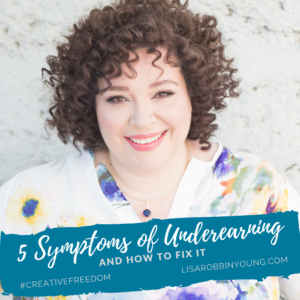This is the last segment on aspects of underearning, but I'm coming at it a different way. Forbes just launched their list of 2018's richest self-made women.
I get where they're coming from, but the truth is that none of us is self-made. None of us just spontaneously appeared from the ether. Someone, somewhere had a hand in our birth and our rise.
So, I'm busting the “self-made” myth bubble in this episode, and showing you the 4 kinds of people you need to succeed, as well as why your environment is such a big deal when it comes to your success.
If you need more structure to get the support you need, or more practice in asking for help, join us in A-Club. You’ll get a lot out of our tight-knit community of folks. We’re all in there, working toward owning our dreams, one step at a time.
Share your thoughts and ideas in the comments. Your insights may spark a conversation that helps someone else!
Mentioned in this episode:
If you haven't already downloaded this week's bonus content, you'll want to do that here. Not a member yet? It's free! When you register for email updates, you also get access to episode transcripts, worksheets, and other downloadables!
Fashion jewelry from Kerianne at FancyBargain.com. Tell her you saw her bling on Creative Freedom!
Music: "Welcome to the Show" by Kevin MacLeod
Licensed under Creative Commons: By Attribution 3.0
We're tackling one of the biggest problems creative entrepreneurs face this week: underearning. Too many years of "paying your dues" working for free or for "exposure" have compounded the problem of creative entrepreneurs owning and asserting their value in the marketplace and charging fees equal to that value. Add to that a sense of shame or other self-worth issues, and you can begin to see how and why this problem persists for so many talented people that don't happen to be as famous or prevalent as Beyonce or Bill Gates.
After years of struggling with this issue myself, and working with clients all over the world who face similar issues, I've identified 5 core traits or symptoms that are common among most creative entrepreneurs. I've tapped two important resources that helped me on my journey through this shadowy valley, and share these insights in this week's episode.
Share your thoughts and ideas in the comments. Your insights may spark a conversation that helps someone else!

Mentioned in this episode:
Rising Tide community members can login and access your free downloads here.
Not a member yet? It's free! When you register for the Rising Tide, you also get email updates, the FREE learning library, and access to episode transcripts, worksheets, and more!
Music: "Welcome to the Show" by Kevin MacLeod
Licensed under Creative Commons: By Attribution 3.0

This is Season Four, Episode Two. Where we tackle the core symptoms of underearning that are common to most creative entrepreneurs. Just because you demonstrate any or all of these symptoms once in a while doesn't make you an underearner. But, if a pattern persists, you'll definitely want to look closer.
This is the first episode in a Summer-long series that deals with different aspects and triggers for underearning. If you want to take this learning deeper, consider joining Overcoming Underearning for Creative Entrepreneurs.
If you’re listening to just the podcast, you’re only getting about a third of the deal. Catch the Creative Freedom web series or join me on Facebook on Fridays at 5:30pm Central time for a LIVE Q&A about the week's topic.
01:00 - How I discovered these 5 Core Symptoms of Underearning
04:35 - Why Chaotics get hit hard with indifference (and how that indifference could be a symptom of underearning)
07:30 - How not looking at my bank account kept me in a spiral of underearning
09:15 - The need for Ruthless Honesty
11:58 - How refusing compliments can be a sign of underearning
15:28 - The myth of "what the market will bear"
17:46 - fixating on competition as a sign of underearning
22:09 - How I bridged my income gap during my first year in Nashville
24:11 - The health symptoms that could be a symptom of underearning
28:07 - You've got to be wiling to accept the consequences of your new choices to overcome underearning
30:00 - Spotting the difference between occasional issues and true patterns of underearning
Download your free guided meditation inside our Rising Tide Community. Not a member? It's free! Click here to join our Rising Tide to get email updates, transcripts, and bonus downloadables only available to members.
Mentioned in this episode:
Music: "Welcome to the Show" by Kevin MacLeod
Licensed under Creative Commons: By Attribution 3.0
In my house, there's a never-ending battle that's almost as epic as the fight for the remote control.
The thermostat.
My husband likes it hot. He closes the vent in our room and bundles under at least two blankets even during Summer!
My son likes it cold. If it's warmer than 65, he'll turn the thermostat down to 50 because he thinks that'll make it colder faster.
Me? I like it in "the dead zone" - a comfortable 70-72 degrees. Not too hot, not too cold.
Needless to say, we've had a few arguments about this. In fact, hubby and I are finally switching sides of the bed this week because he's been sleeping closer to the vent (which is why he keeps closing it).
But...even more datstardly than our family fight for the house thermostat is the epic battle that's been going on between my ears for years with my metaphorical "success thermostat".
You may have heard it called an upper limit problem - that's a term Gay Hendricks used in his book "The Big Leap." Like a thermostat, our brains have a "success set-point" that keeps us comfortable. When we get too far below that set-point, we get uncomfortable, and start working to turn up the heat on our success. But I had a cap on what I believed I deserved. My "success ceiling" was a set-point that actually kept me earning poverty-level wages. No joke!
It was as if every time my money situation started improving, or things started going very well for me, invariably something would happen and things would start to fall apart. My success set-point kept trying to cool things off just as I was heating up!
In her book "Overcoming Underearning" Barbara Stanny says that "money is a metaphor" and that "under-earning is a symptom" - specifically a symptom of a lack of self-worth or self-love. It manifests differently for each person, but ultimately, it centers on a success ceiling/upper limit problem around what you think you deserve.
This week's episode of Creative Freedom revels how to know if you're a chronic under-earner, how I discovered my under-earning success ceiling, and how I've worked to eliminate my upper limit problem in my own life. Oh, and you'll hear bits of my U2/Journey mashup from the 300 songs project.
One look at the Symptoms of Underearning from Underearners Anonymous and you'll have a better idea of whether or not your current financial state is because of a conscious choice to live on less, a short-term slump, or a chronic condition that's due to something deeper.

1. See the truth and OWN it. Just like a real thermostat setting, we have to make adjustments if we want to see things change. For most of us, we can't just "flip a switch" and solve the problem. Further, the "temperature" of our situation will most likely change gradually. You can't go from 32 degrees to 70 degrees in a matter of seconds - it takes time to turn up the heat! Decide on your new direction. What's going to change for you? Then commit to it, and be willing to make small (even microscopic) changes as you move toward your new set-point. The smaller the better actually. It might feel more tedious and time consuming, but micro-commitments are more likely to stick and lead to lasting change because they don't activate the fear centers in your brain. It's the fear center that triggers the thermostat to go back to what's "comfortable" - clearly a relative term when it comes to success.
2. Be wary of people who aren't used to your new settings. They will be uncomfortable (so will you). I have a colleague that says "new level, new devil". Remember what I've taught you before - you train people how to treat you based on what you've come to accept from tehm and what they've come to expect from you. Changing your success thermostat means you're changing the expectations. Some people won't like that - get used to it. It happens. The key is to recognize when people are trying to change your settings and stay the course even if things start to get a little (okay, a LOT) uncomfortable.
3. Believe you are worth it and stay vigilant! This is where all the micro commitments make a difference. Trying to re-program your brain to overcome years of unconscious programming ain't easy. When you've believed for decades that you're not capable of achieving a certain level of success, your brain may have difficulty accepting new ideas that seem to fly in the face of that old understanding. You need to keep looking for evidence for the file clerk in your head that says you are capable. Celebrate your wins even if they seem "small" or "insignificant" - the file clerk doesn't judge.
Eventually, the new set-point will feel comfortable. It takes time and patience, but it's totally doable.
Under-earning is one of the most prevalent problems of the creative community. From working for "exposure" to donating our time and offerings to way too many worthy causes, creative entrepreneurs need to reclaim their money making power! If you've overcome an upper-limit problem, we'd love to hear about it! Share your stories in the comments and be part of the Rising Tide community!